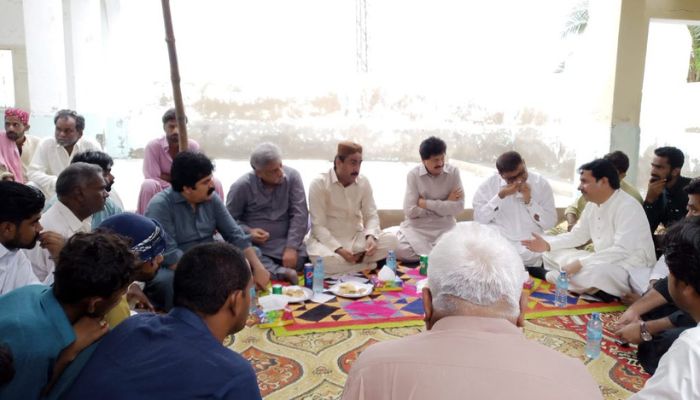Bilal Kaka murder: Opposition parties condemn PPP, see ‘conspiracy’ ahead of LG polls
PTI Sindh president Ali Zaidi appeals to both Sindhis and Pashtuns to demonstrate restraint
July 16, 2022

- Bilal Kaka, 35, was killed in a hotel in Hyderabad on July 12.
- Opposition parties criticise the Pakistan Peoples Party-led Sindh government for failure to curb violence.
- PTI Sindh president Ali Zaidi appeals to both Sindhis and Pashtuns to demonstrate restraint.
After Bilal Kaka, 35, was killed in a hotel in Hyderabad on July 12, ethnic tensions heightened in several Sindh districts, including Karachi. Opposition parties criticised the Pakistan Peoples Party-led Sindh government for not being able to stop the violence, while rights groups called for calm.
PTI appeals for restraint
Pakistan Tehreek-e-Insaf Sindh president Ali Zaidi appealed to both Sindhis and Pashtuns to demonstrate restraint and said a conspiracy had been hatched to destroy the peace in the province.
"The people have to go beyond ethnicity and think about the peace and security of the country," said Zaidi, former federal minister, while addressing an introductory session of its candidates for the upcoming local government polls held at the Mazar-e-Quaid.
Zaidi also questioned where the Sindh government had been doing in the entire situation. He said the PTI was the "only political party" in the country that was "beyond ethnicity".
Separately, Khurram Sherzaman, the PTI parliamentary leader in the Sindh Assembly, said the PPP’s silence on the Hyderabad incident was alarming and posed a question mark.
"Ethnic riots have been flared up deliberately before the upcoming local government polls," he said while addressing a press conference. He held the Sindh government responsible for the "worst governance".
"Anti-peace elements want to exploit the bad governance of the province, and action should be taken against them."
The PTI leader said the provincial police chief was absent after the Sohrab Goth incident, which showed that the city's law and order was "not [seen as] a problem" by the Sindh police. He said "only the PTI chief and former prime minister Imran Khan could unite all the ethnic groups living in Sindh".
JI sees agenda
Hafiz Naeemur Rehman, chief of Jamaat-e-Islami (JI) Karachi, said fanning ethnic polarisation in society was "part of a nefarious agenda" to gain political advantage and manipulate public opinion.
At a press conference on the Hyderabad incident, Rehman said, without naming political parties, "The political forces that have lost popularity because of their failure to deliver on the ground are attempting to gain the sympathy of voters belonging to a certain ethnic background through such types of events."
He said the PPP government should have played its due role in curbing tensions in the Sindh province. "Such a nefarious design to win polls is totally unacceptable." The JI leader said that urban areas of Sindh would not be able to handle any more ethnic divisions.
He offered the JI’s services to curb the tensions and held out the assurance that the party’s leadership would play its role without any sort of political point-scoring.
He said hatred that emerged from such types of events shrouded genuine issues and questions. "What did the PPP do for Karachi in the past 14 years? Why is Karachi submerged in monsoon rainwater every year? Why are a large number of areas in the city deprived of clean water? These are genuine questions, but instead of responding to these questions, some powers create scenes to divert the attention of people," he said.
Rehman appealed to the masses in Karachi and other parts of the province to demonstrate unity and reject the politics of hatred and division. He further said that the motherland of Sindh belonged equally to all its dwellers and no one could bring this relationship to an end. He added that the ruling class wanted to "play their old dirty tricks of divide and rule".
The JI leader demanded the government and law enforcement agencies hold a crystal clear inquiry into the Hyderabad tragedy and take strict action against those who stirred ethnic tensions and carried out an economic massacre on the basis of the incident. He also lambasted the provincial government over what he called criminal negligence in handling the unrest.
HRCP seeks probe
The Human Rights Commission of Pakistan (HRCP) is increasingly concerned by the escalation in ethnic and political tension in Sindh.
In a statement, the HRCP called for the murder to be investigated fairly and transparently and for the Sindh government to take steps to control crime and violence in the province. "At the same time, it falls to the authorities as well as to all progressive voices in Pakistan to shun divisive or racist rhetoric."
The HRCP said it planned to send out a fact-finding mission to find out what happened when Bilal Kaka was killed and what caused the ethnic tension that followed.
NCHR-SHRC
The National Commission of Human Rights and the Sindh Human Rights Commission announced they would convene a meeting on Monday where both commissions and key representatives of civil society, academia, lawyers, and other professional groups would discuss a collective response to the escalation in ethnic and political tensions in Sindh.
Both rights bodies, in a joint statement, said Sindh, particularly Karachi, had always remained vulnerable to ethnic strife. "Though we have witnessed calm for the last several years, this week’s events have exposed the fragility of this peace and it seems like a small incident can turn into a major ethnic conflict," the statement said.
The commission said that misuse of social media was serving the purpose of adding fuel to the fire. The Sindh police and Rangers could have handled the situation "more pro-actively"; however, some politicians from both sides had called for peace, the statement said. It said that everyone would have to work together to fix the problem and come up with suggestions to stop it from happening again.
The NCHR and SHRC said they believe that human rights are the first casualty of the threat to peace and that we must play our role in promoting peace and harmony.
MWM voices concern
Expressing his deep concern about the persisting ethnic tension in Sindh between the Pashtun and Sindhi communities, Majlis Wadhat-e-Muslimeen’s vice-chairman, Allama Ahmed Iqbal, said such a situation could lead to ethnic riots in Sindh, which would harm the peace of the entire country.
Iqbal said that "imperialistic powers like the USA, Israel, and India are playing evil tricks to sabotage the peace of Pakistan".
"Their puppets are active to fuel any riot, but the state institutions and authorities should take responsibility to thwart any conspiracy against their beloved homeland." The MWM leader said that anti-peace elements should not allow anyone to violate laws in the name of region, ethnicity, or sectarianism.











